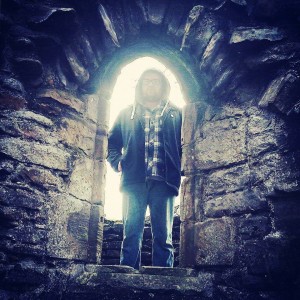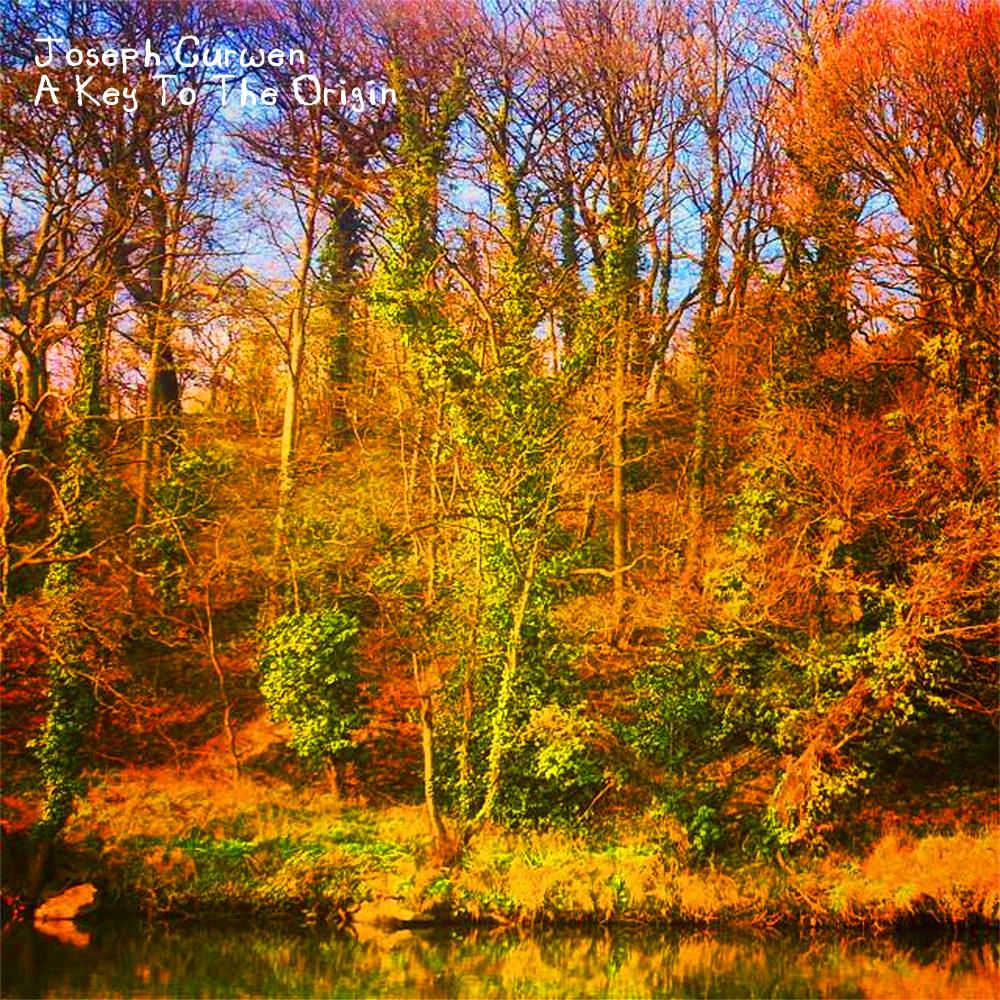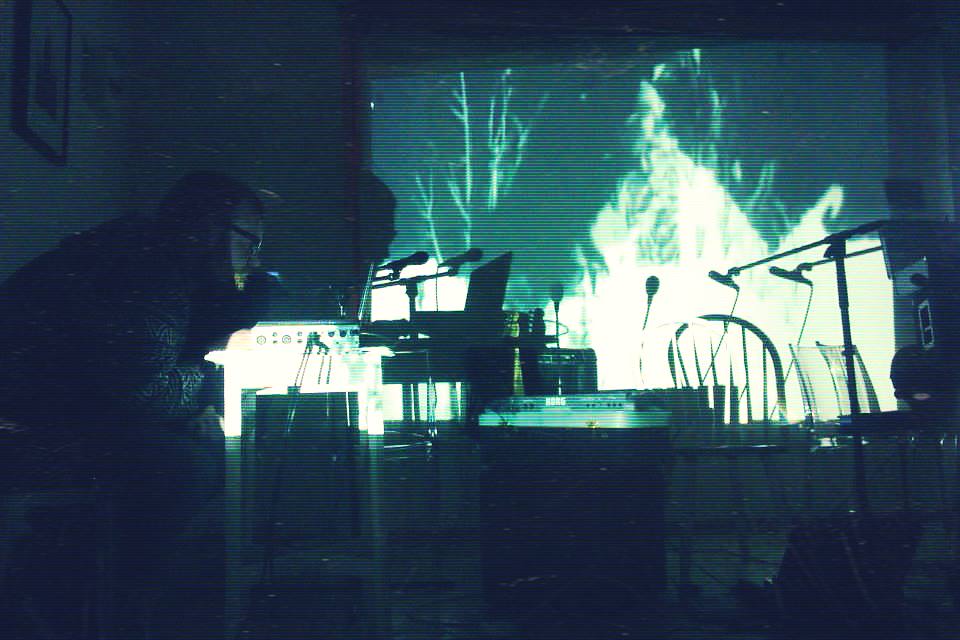 Let’s start with the origin of your project. Is Joseph Curwen the first project or have you played in other projects/bands before? What kinds of music/sound did you grow up with?
Let’s start with the origin of your project. Is Joseph Curwen the first project or have you played in other projects/bands before? What kinds of music/sound did you grow up with?
I was lucky enough to be raised in a musical household. I grew up surrounded by 70s rock and psych records, and an old upright piano. I grew up in a tiny village in County Durham in the early 90s, and was exposed to rave culture at a young age. Most of the kids I went to school with had older siblings and parents that regularly went raving, so techno and rave tape packs would always be playing when I went to people’s houses. I remember the sense of shock felt when there was an ecstasy death in the village. This instilled in me the dichotomy between euphoria and nostalgia inherent in a lot of dance music. I’ve always been interested in bass heavy music of all genres, including a life long fascination with heavy metal. I played bass for years in many many bands, and was aware that audiences react to low frequencies in primal ways, from crippling doom bands to wedding function bands, the physicality of bass is always there. All any of us are is the sum of our experiences, so I’ve assimilated my love of drone and rave/dance into something I call post-rave hauntology rituals. I call it this as a way of visiting my personal and musical experiences of the past in a performative way. As Joseph Curwen I’ve also worked with The Dead End Street Band and CHONYID. I really enjoy creating by myself as I can plan meticulously the way sounds weave and interact with each other, but when playing with others I appreciate the opportunity to manipulate sounds on the fly, and react to those around me. I have a great satisfaction doing both. My latest album “A Key To The Origin” is I feel the closest I’ve got to a pure post-rave hauntology ritual since I first envisaged Joseph Curwen a couple of years ago, hence the title.
I think given your project name and titles of releases we have to talk about HPL. How was your first encounter with his works? Given your interst in the man from Providence I was wondering if you’ve followed the recent heated debate whether the World Fantasy Award statuette that portrays him should be replaced by somebody else beause of his views (on race etc.) and S.T. Joshi’s recent posts in which he tries to defend Lovecraft. How do you feel about that discussion?
I first encountered HP Lovecraft as a teenager, when I discovered a lot of my favourite heavy metal musicians were inspired by his writings. I bought a compilation of his works called “Necronominocon” and devoured it with relish. I felt like my initial experiments with drone had a weird sense of dread to them, so dedicating the project to his take on what we can never genuinely know from half-dreams and memories felt natural.
I personally don’t subscribe to Lovecraft’s views on race, but I am wise enough to appreciate he was of his time, and a lot of people from that era would have held views on other people that today seem backward and unnecessary.
Do you think there is something like the core substance or essence of Lovecraft’s fiction (Joshi would maybe emphasize his cosmicism), and if yes, how would you describe it? What makes his fiction outstanding for you, compared to other writers? How did you come up with the idea of handeling your fascination for supernatural horror and Lovecraft in a work of its own?
I have always appreciated Lovecraft’s sense of the genuine unknown in his stories, and think that no one has come close to describing the cosmos in such a weird way. There are significant activities in the Universe we as human beings will never understand, whether you believe in monsters in the sky or subscribe to accepted scientific thought. I try to instill this sort of uncomfortable atmosphere in my music, like you’re listening to a recording of a dream you had about a musical memory. A lot of his stories feature seemingly normal people thrown into berserk situations, and I’ve always related to that.
What is your attitude towards the attempts of the HPL-historical society to create films and  radioplays that reflect the times when the stories were written, i.e. using a medium like the silent film or the black-and-white film? I’m asking because you have a very striking aesthetic. I think one immediately recognizes your releases due to their use of colour(s). And you certainly did not go for some kind of retrodesign. Can you say a few words about that?
radioplays that reflect the times when the stories were written, i.e. using a medium like the silent film or the black-and-white film? I’m asking because you have a very striking aesthetic. I think one immediately recognizes your releases due to their use of colour(s). And you certainly did not go for some kind of retrodesign. Can you say a few words about that?
I can see the appeal of trying to emulate an atmosphere that HP Lovecraft would recognise, and sometimes putting artistic restrictions on yourself is a great way of being creative with what you are working with. I have always been a fan of technology, and my work as Joseph Curwen is a reflection of this. I appreciate that you’ve mentioned I have a striking aesthetic, as I spend a long time on each cover, ensuring it reflects the corresponding music properly. My use of colour is from my love of colour. I like to think my music is as vivid as the album covers.
In your self description you use the popular term hauntology. The philosopher Derrida once invented this term to describe a certain ambivalent twist in contemporary western mind – political ideologies seemed to have disappeared from our mainstream, but secretly they still haunt the subconscious of western man. Do you have a relation to this use of the term, or does it rather refer to a more general interest in aspects of haunting?
I’ve only recently looked into Derrida’s writings, but I do think he puts forward a compelling idea. Everyone is haunted in some way, from memories of the distant past, to stories they’ve been told by other people, to subconscious survival stuff passed down by our ancestors. We’re all a blend of genetics and history, with actual and perceived experiences passing us by every day, so who is to say what the subconscious mind actually holds? The term Hauntology has been bastardised for all sorts of reasons by many people. My personal take on it is to look back at musical movements important to me throughout my life, and explore them as doorways to my own past, through exploratory sound design using the wisdom of who I am now. A lot of my recent material has explored my love of dance music, in particular the rave culture of the early 90s, and investigates the idea that euphoric music can often be haunted by something dark and evil. As a child in the early 90s I felt like anything was possible, and a lot of the music of that time that I was exposed to felt like it was heralding a new dawn of utopia for mankind. Obviously what those people were aiming for never transpired, so everyone who enjoyed it at the time is now haunted (in some form) by it. I hope I’ve managed to create music that emulates the ghost of dance music in a way, the euphoria of the past have dissolved into something anxious and unnerving.
What can you tell us about your way of writing, improvising and recording music? Do you follow a spontaneous approach, or do you prefer to compose in a way that allows you more control?
The earliest days of the project were very structured, and were mainly experiments in digital bass weight. I’m proud of the early pure drone material, but feel like I took it as far as I could. As the project has evolved, and I’ve learnt more and more about digital audio technology, my writing approach has developed aspects that are a lot more spontaneous. I still meticulously plan out a lot of the structure, and carefully map out how the drones interact with each other, but now I can take small samples of music, and manipulate them beyond recognition in real time, adding them to the drones as a means to be more cinematic and evocative. My work in The Dead End Street Band and CHONYID has taught me a lot about layering textures, and creating atmosphere with more evolving and varied sounds. Joseph Curwen is a constantly evolving process, and can be viewed as my research into audio technology and sound design. I am a degree carrying devotee of Mathematics, so a lot of my enjoyment comes from ensuring my choice of effects and compressors etc. are mathematically sound for maximum sonic impact or effect. I subscribe to the idea that maximum volume yields maximum results, and appreciate that some of my material can get quite brutal, but I hope listeners can enjoy my albums as adventures in atmospheric sound design.
How long does it take you to record an album like for instance “Lurking Fear”? Some of your recordings are released in tiny quantities (of tapes), others like the abovementioned “Lurking Fear“ or “Blasphemous Alliance“ most certainly defy any possibility of releasing them in a physical format. Do you feel that our digital age has freed artists from the constraints of the (physical) medium? I guess the number of listeners that play such an album as a whole in full concentration is limited. Would such a long release serve as a background ambience?
Lurking fear took about 36 hours in real time to write, record, and process. It was originally intended as an art installation, which eventually mutated into Lurking Fear 2: Starling Shadows. I appreciate that some of my recent digital releases have been obnoxiously long, but drone music is supposed to invoke an atmosphere, and I am certain that both Blasphemous Alliance and Lurking Fear do that. I know certain members of my core fan base have listened to both of them in their entirety. I like that digital outlets such as Bandcamp allow artists to present albums as long as they see fit, but physical formats such as cassettes allow a more personal connection to occur between the artist and listener. I use Bandcamp as it allows me to instantly upload and distribute my music to my fans, allowing me to directly contact them.
I feel that some of your music is similar to the mood that e.g. somebody like The Caretaker tries to create. Do you feel a (kind of) kinship to other artists who work in a similar field?
I have been likened to The Caretaker before, as well as artists like Lustmord and Aphex Twin. I always appreciate being compared to artists I respect, as well as others I can newly discover. I feel kinship to anyone that is being musically creative. I don’t aspire to be like anyone else. I make music as Joseph Curwen because it is the music I want to listen to, the fact that others have really bonded with it and listen to it as well is an awesome bonus.
What is the relationship between those recordings that have some kind of beat and those that focus more on soundscapes? On your bandcamp site you can find some live recordings. Is there something like a typical Joseph Curwen performance? Do you make use of visuals?
I started out purely doing soundscapes because I wanted to explore texture and timbre within drone. I’ve always been a massive fan of techno so started to experiment with beats as a means of making the drones easier to digest. I think if there’s something for the listener to grasp, a thread that runs throughout the “narrative”, they’re more likely to get pulled into the atmosphere I’m trying to create. Since introducing beats and rhythmic textures in Curwen I’ve started making music as Granite Portal so I can fully explore my enthusiasm for jungle and gabba rhythms, and utilise repeating phrases and more dance floor orientated structures.
 When performing live, I like to expose people to what Joseph Curwen is, as loud as possible. A typical Curwen gig involves me preparing some material in advance for further exploration, then in effect DJing my own drones, bringing different timbres and shards in and out of the mix as a reaction to the audience and the room I’m in. I can then manipulate effects in real time for extra timbres and effects. I tend to revert to a primal state when performing live, and let myself get completely lost in the noise. Some sets are very similar to practise runs, other have come out completely differently. I guess that could be called the ritualistic aspect to the music. I enjoy the use of visuals as a means of further filtering the audience towards the atmosphere I’m trying to create with the music. I am comfortable performing without visuals, but an accompanying video is a lot more entertaining to watch than a man behind a laptop.
When performing live, I like to expose people to what Joseph Curwen is, as loud as possible. A typical Curwen gig involves me preparing some material in advance for further exploration, then in effect DJing my own drones, bringing different timbres and shards in and out of the mix as a reaction to the audience and the room I’m in. I can then manipulate effects in real time for extra timbres and effects. I tend to revert to a primal state when performing live, and let myself get completely lost in the noise. Some sets are very similar to practise runs, other have come out completely differently. I guess that could be called the ritualistic aspect to the music. I enjoy the use of visuals as a means of further filtering the audience towards the atmosphere I’m trying to create with the music. I am comfortable performing without visuals, but an accompanying video is a lot more entertaining to watch than a man behind a laptop.
Any final words?
Please check out https://josephcurwen.bandcamp.com/ and if you like any of it, please consider supporting me.
If you like what you hear or fancy getting in touch, I’m on Twitter as @curwendrone.
All digital noise intended, thank you for listening.
Also:
Granite Portal: https://graniteportal.bandcamp.com/
Dead End Street Band: https://thedeadendstreetband.bandcamp.com/
CHONYID: https://chonyid.bandcamp.com/
(M.G. & U.S.)
